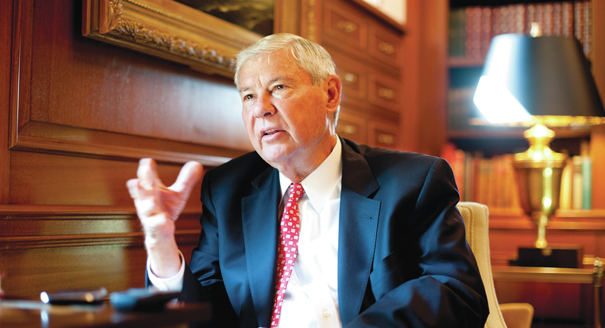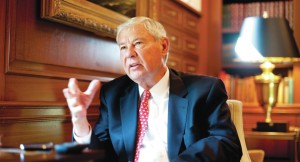
Ex Florida Governor Graham travels to Cuba
Former Florida Governor and U.S. Senator Bob Graham, a long-time supporter of the embargo, [traveled] to Havana Monday as part of a U.S. group that will talk with Cuban officials about offshore oil drilling safety.

The delegation, consisting of about a dozen experts, was put together by Julia Sweig of the Washington-based Council on Foreign Relations (CFR), the Naples (Fla.) News first reported.
Sweig did not immediately respond to e-mail messages from Cuba Standard.
Graham, who was the keynote speaker at an environmental conference in Naples Saturday, told the Naples News reporter that the group plans to talk to Cuban officials and understand their offshore plans and capabilities, as well as “how the international community can cooperate in a way to ensure that Cuba drills at the highest level of international safety standards.”
“It’s very important for the nation, and particularly important for Florida, that any drilling done in that area be done at a very high standard of safety and with the capability to respond if there is an accident,” Graham told the Naples News.
The trip comes half a year after a custom-made deep-sea drilling platform pulled out of Cuban waters, due to lack of success. Russia’s Zarubezhneft said last year it plans to resume near-shore drilling in 2014.
Graham was co-chair of the National Commission on the Deepwater Horizon Oil Spill and Offshore Drilling after the April 2010 disaster in the Gulf of Mexico.
According to a CFR press release, the delegation will be in Cuba for five days. The group includes former Environmental Protection Agency administrator William K. Reilly; Jason Eric Bordoff of Columbia University’s School of International & Public Affairs; Michael R. Bromwich of Goodwin Procter, LLP; David L. Goldwyn of Goldwyn Global Strategies; Richard J. Lazarus of Harvard Law School; Megan Reilly Cayten (Catrinka); Vicki Seyfert-Margolis (MyOwnMed); and Dan Whittle of Environmental Defense Fund.
The delegation is part of a longer-term “Study Group on Marine Disaster Prevention and Preparedness in the Gulf of Mexico” set up by the CFR.
“The group aims to promote the exchange of information and strengthen communication between U.S. and Cuban experts, policymakers, and practitioners within the fields of gas and oil exploration, natural disaster mitigation, coastal sustainability, and regulatory oversight of the Gulf of Mexico,” the CFR press release said. “The study group is comprised of senior practitioners and policymakers in the fields of energy, the environment, climate and sustainability, commerce, the food supply, and security in the Gulf of Mexico.”
This is not the first time a U.S. group holds talks in Cuba over offshore oil safety. In 2010, the Houston-based International Association of Drilling Contractors (IADC) sent a delegation to Havana, just after the Deepwater Horizon blowout.
The U.S. government has refrained from any direct contact with Cuba over oil safety. However, as part of an ongoing multilateral initiative to organize protocols in case of oil spills in the Caribbean and Gulf of Mexico, U.S. and Cuban officials met in July in Florida, together with officials from other nations in the region. The meeting in St. Petersburg was the continuation of talks begun in 2011 under the auspices of the UN Regional Marine Pollution Emergency Information and Training Center (REMPEITC); they involve officials from the United States, Cuba, Bahamas, Jamaica and Mexico. The goal of the meetings is to elaborate preventive regulatory frameworks, safety standards for drilling platforms, and best practices in oil spill containment.
U.S. participants have included officials with the Coast Guard, the Department of the Interior Bureau of Safety and Environmental Enforcement, the Department of Commerce National Oceanic and Atmospheric Administration, the Environmental Protection Agency, and the Department of State.
When a deep-sea drilling platform was on its way to Cuba in 2012, U.S. officials inspected the vessel while docked in Trinidad and Tobago.
(From Cuba Standard)

